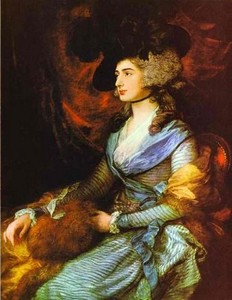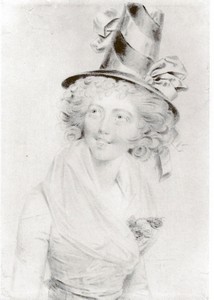Proposal for a Panel for EC/ASECS, November 1-3, 2012, Baltimore, Maryland. Laura Engel (Fashioning Celebrity Eighteenth Century British Actresses and Strategies for Image Making) has agreed to be respondent.

CFP: R-e-s-p-e-c-t: For actresses and women playwrights respect and favorable reputation matter
In the last couple of decades studies of actresses and women playwrights have slowly increased, and have (seemingly inevitably) become intertwined with studies of prostitution, celebrity culture and fashion. Thus the increase in studies of actresses has brought an increase of studies of the lives, treatment and status of prostitutes (real and fictional), of the fashion industry's intersection with stage, film and TV. The question also continually arises how inexorable was the identification of women who made their living from the public stage with sexual promiscuity, and how deleterious and to whom such shaming was. Admittedly ambiguous evidence suggests that if such women married or became the mistress of a respected, wealthy, and aristocratically-connected man, or the partner (however temporarily) of an actor-manager or theater owner or director in reality such connections were functional helps and gained some women respect. Retrospective analysis (looking back from the mid- to later 19th century) suggests that if the actress broke another taboo, and published her memoirs, as long as she presented herself in sufficiently respectable ways, that is to say, as a hard-working craftswoman with effective successful specialized skills (not just in acting or playwriting, but as a fashion icon), her text and behavior paradoxically gained sympathy, understanding for herself and (eventually) other actresses and the theater trade as art and job. The actress's acute preoccupation with her status was after all shared by actors and the theatrical world in general. I call the effect of life-writing paradoxical because such writing also could and did reinforce the persistent identification of public performers with the roles they play (including defamatory ones), and the impulse in the public to slut-shame women as a means of control since until recently in the theater women remained subordinated to men (men were overwhelmingly the writers, producers, directors, owners).
I invite papers on the ways theatrical women coped with apparent and real infamy in the long 18th century, on the life-writing they and others wrote about them, on their own theatrical and other writing; papers on the way prostitution has been treated both in life and in plays (and novels), on costume design (which would include cross-dressing and transvestism). Also very welcome would be any studies of women as published critics of the drama, of Shakespeare, and as editors themselves (including editions of letters).
Ellen Moody
George Mason University

Home
Contact Ellen Moody.
Pagemaster: Jim Moody.
Page Last Updated 10 March 2012